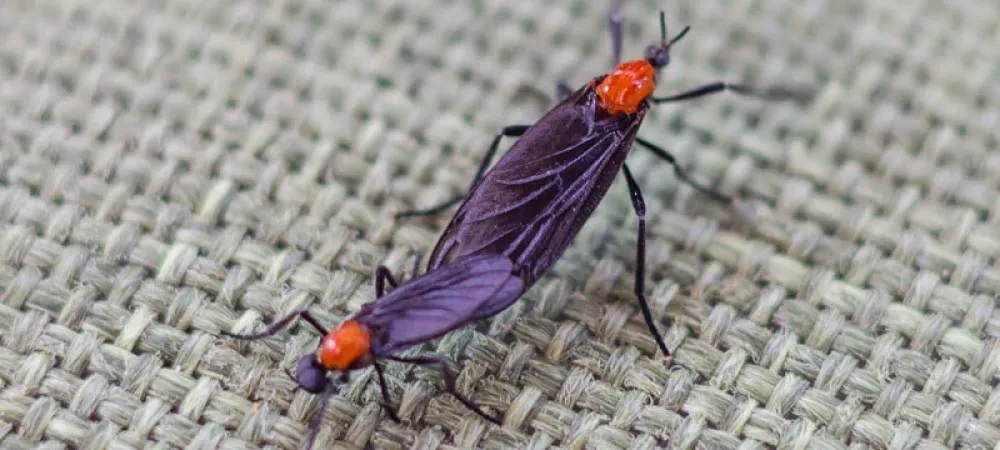What Are Love Bugs? What You Need to Know

What is a Love Bug?
Love bugs, scientifically known as Plecia nearctica, are small black flies with a distinct red thorax. These insects are notorious for their synchronized swarming behavior. While they may appear harmless, they can cause quite a disturbance when they gather in large numbers, especially during peak love bug season in North Carolina.
Love Bug Season in North Carolina
Love bugs in North Carolina are most active during two major swarming periods:
- Late April to May
- Late August to September
During these months, love bug swarms can last for up to five weeks. These insects are particularly noticeable near highways and in areas with tall grass or decaying organic matter, making them hard to ignore.
Why Are Love Bugs Stuck Together?
One of the most noticeable and curious behaviors of love bugs is their tendency to fly while attached to each other. This happens during their mating process. After mating begins, the male and female love bugs remain joined together for extended periods—sometimes for several days.
What Are Love Bugs Attracted To?
One of the most puzzling aspects of love bugs is their attraction to specific environments. You might wonder, What are love bugs attracted to? Here are some of the top attractants:
- Engine Exhaust and Heat: Love bugs are particularly drawn to the exhaust fumes and heat from vehicles, making them a common sight on highways.
- Light-Colored Surfaces: You’ll often find love bugs accumulating on light-colored buildings and cars, though the reasons for this preference are not entirely understood.
- Nectar and Pollen: Adult love bugs feed on nectar from plants like sweet clover and goldenrod, which can be abundant in rural North Carolina.
- Decaying Organic Matter: Female love bugs lay their eggs in moist, decaying debris such as grass clippings and dead leaves.
- Aldehydes and Essential Oils: Love bugs are also attracted to chemicals found in plants and vehicle exhaust, which is why they swarm in certain areas.
Do Love Bugs Bite?
No need to worry—love bugs do not bite or sting. Despite their overwhelming presence during love bug season, they are completely harmless to humans and pets. Their primary interest is in mating and finding suitable environments to lay eggs.
How to Get Rid of Love Bugs
While love bugs might not pose any physical threat, their presence can be an annoyance. If you're dealing with a love bug swarm, here are some effective ways to minimize their impact:
- Remove Yard Debris: Love bugs lay their eggs in moist, decaying organic matter. Keeping your yard free of grass clippings, leaves, and other debris can reduce their breeding grounds.
- Mow Regularly: Maintaining a well-manicured lawn prevents love bugs from finding ideal habitats for egg-laying.
- Use Fans Indoors: If love bugs find their way into your home, using fans can help deter them. Love bugs struggle to fly in strong air currents.
- Homemade Solutions: Make a homemade spray by mixing 1 cup of water, 3 tablespoons of citrus dish soap, and 3 tablespoons of mouthwash in a spray bottle.
Get Professional Help
Love bugs may be harmless, but their swarms can feel overwhelming during love bug season in North Carolina. Keeping your yard clean and maintaining your vehicle are good steps, but for more effective management, professional pest control services can help reduce their presence around your home. Contact the team here at Peeler Environmental for help with love bugs or any other pests invading your property!
